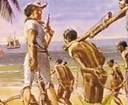
Britain's first research unit into slavery was opened yesterday in Hull, the home of William Wilberforce, who led the campaign to abolish the trade.
The Wilberforce Institute, at Hull University, will research the history of slavery, including the collaboration of some Africans with the traders, up to today's traffic of women for the sex trade. Its first patron is the Nobel peace laureate and archbishop emeritus Desmond Tutu.
The unit was opened by the president of Ghana, John Agyekum Kufuor, ahead of next year's bicentenary celebrations of the legal emancipation of slaves in Britain.Other items:
- Hardship & Sorrow - The Slave Trade
- The Trans-Atlantic Slave Trade
- The Slave Trade - Timeline
- Mariner's Museum - Captive Passage
- Slave Movement in the 18th & 19th Century
The Atlantic slave trade (Atlantic slave trading) was the purchase and transport of Africans into bondage and servitude in the New World. It is sometimes called the Maafa by African and African-American scholars, meaning holocaust or great disaster in kiSwahili.
The slaves were one element of a three-part economic cycle—the Triangular Trade and its infamous Middle Passage—which ultimately involved four continents, four centuries and the lives and fortunes of millions of people. Research published in 2006 reports the earliest known presence of African slaves in the
A burial ground in Campeche, Mexico suggests slaves had been brought there not long after Hernán Cortés completed the subjugation of


